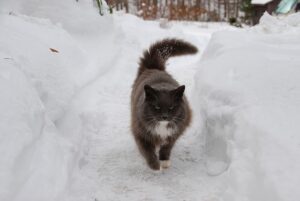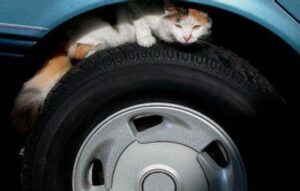
- Most cats prefer to snuggle up inside during the winter but if yours is the outdoors type make sure they always have a warm place they can go to at all times.
- Cats that usually go to the toilet outside may need a litter tray inside, especially when there’s snow on the ground. Remember the plus one litter box rule i.e. if you have two cats it is best to have three trays available spread around your home.
- Always make sure your cat comes inside at night, locking the cat flap once they are inside. Provide them with warm, comfortable and safe places to sleep. When snow is deep cat flaps can become blocked so you’ll need to check them to make sure that your cat can get out and, more importantly, back in again.
- Make sure your cat is fitted with a microchip so if they do wander off in search of a warm place they can be traced back to you. Please check the details are up to date and correct.
- Look out for hidden dangers over the festive season – poinsettia and lilies are popular Christmas plants but they’re actually poisonous to cats. And keep tinsel out of reach if you don’t fancy a trip to the vet to have it removed from your cat’s gut or rear-end.

Cats left outdoors often crawl into a warm car engine to get warm and, when the engine is started up, they can be seriously injured or even killed. Make sure to tap the bonnet of your car and check around the wheels and on top of tyres before you start the engine and drive off. They might also venture somewhere they shouldn’t and get trapped without food or water. If in doubt, keep your cat inside.

Watch out when using car screen wash. Ethylene glycol, otherwise known as antifreeze, can be fatal to cats if they ingest it. This is an issue because cats are attracted to the taste of it. Antifreeze is most commonly used in car radiators and can be found in screen washes and de-icers. It is also sometimes wrongly used in garden ponds and water features to stop them freezing over, but this poses a significant risk to cats, dogs, and lots of other wildlife so should be avoided. You should store any products securely and clean up any spills straight away. If you think your cat may have ingested antifreeze or been exposed to it in any way, get in touch with your vet immediately as it’s vital to act quickly. Signs that your cat may have ingested antifreeze include an increase in urination or drinking, vomiting, lethargy, seeming uncoordinated or “drunk”, seizures, unusually fast heart rate, and fast and shallow breathing.
- Cats keen to venture outdoors might still want to brave the temperatures – even during a harsh winter. If your cat has access to the outdoors, provide them with a shelter to ensure they are safe. A sturdy cardboard box covered in plastic sheeting should do the trick.
- Ensure that your cat has plenty of fresh water indoors, in case any outside sources freeze.
- Regularly check sheds, outhouses and garages to ensure your cat isn’t locked inside.
- If the weather becomes particularly cold, keep your cat indoors. While they might seem bored or restless, pet cats aren’t used to extreme temperatures and can even develop frostbite or hypothermia. Keep them entertained and exercised with enrichment toys and feeders. Alicat Purrfections makes a variety of handmade catnip toys to keep your kitty cats entertained. https://alicatpurrfections.co.uk/alicat/is-your-cat-driving-you-mad-working-from-home-by-constantly-demanding-attention/

When your cat comes in from being outside, check their paws and gently wipe them with a damp cloth or towel in order to remove any rock salt or chemicals. Roads may have been salted or gritted, so you’ll need to remove this from your cat’s paws so that they don’t ingest it when grooming. It’s also good to check your cat’s paws frequently for any signs of frostbite, irritation from the salt or other injuries. This is especially important with long haired cats as they are prone to snow compacting between their toes which then turns into ice balls which can be very painful.

Fire works are often very frightening for our fur babies and can cause stress. The best way to keep them safe is to bring your cat in before dark. Do this a few times so your cat gets accustomed to being indoors at night. Make sure all windows are closed and cat flaps locked. Provide hiding places, your cat may well be frightened and want to hide. Keep calm and carry on – as tempting as it is, try not to cuddle your cat more than you usually would. Changes in your usual behaviour could add to their anxiety as he/she believes there is something to worry about. Playing music is a great way to mute out the sound of fireworks or watching TV. You can get cat music on YouTube that can help relax your cat. Distractions such as toys and treats to keep their attention on positive things. Keep blinds and curtains closed, this helps hide the flashes and reduce the bangs of the fireworks. You can also use a pheromone-releasing diffuser in the room your cat spends most of their time to help them feel more relaxed.

